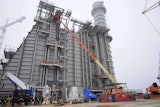UBS recently came out with its 20th Agricultural Dealer Survey, which shows that farm equipment dealers continue to expect lower farm machinery sales in 2006. The firm also says the level of dealer optimism continued to decline over the last 6-12 months.
In responding to the survey - UBS said it received more than 400 responses - dealers highlighted higher energy costs, rising interest rates and weakness in certain commodities (rice and dairy) as negatives. Meanwhile, the group was generally optimistic about ethanol.
"Additionally, dealers believe farm bill negotiations create uncertainty and dampen equipment demand," said UBS analyst David Bleustein. "Given the reduced level of optimism in the dealer survey, we believe the negative impact of elevated input costs, rising interest rates, difficult machinery comparisons and uncertainty created by potential changes in farm support programs may more than offset the recent strength in farm commodity prices and the optimism created by increased demand for ethanol."
For 2006, Bleustein expects flat-to-slightly-lower sales of ag equipment in the U.S., supported by recent softness in row crop tractor sales. He's also seen evidence of Europe being somewhat stronger than expected, with Agco being a major beneficiary.
This year, UBS sees total corn use of 11.645 billion bushels, led by continued strength in corn used for ethanol and increased corn exports, though the firm sees a minor reduction in corn used for domestic feed. UBS is calling for just a 10-cent-per-bushel increase in corn prices over 2005 levels.
(Interestingly, Bleustein said he's noticed that changes in corn prices have been a reliable coincident indictor of agricultural machinery-stock price performance since the mid-1970s.)
"For 2007, we believe the corn supply/demand fundamentals could be considerably more favorable, driven primarily by the increased consumption for ethanol," Bleustein said. "Although ethanol is not a new phenomenon, we believe the continued ramp in ethanol capacity could tip the supply/demand balance to a shortage position in 2007-2008."
According to the renewable Fuels Association, 97 ethanol plants are currently online with an annual production capacity of roughly 4.5 billion gallons. Thirty-three more plants are under construction, which could bring the total capacity to about 6.4 billion gallons per year.
Meanwhile, in construction equipment, the analyst noted signs of a weaker light-construction equipment market in the second quarter, which could pose some earnings risk to Deere and CNH Global. Based on data provided by both CNH and the Association of Equipment Manufacturers, he thinks sales of skid steer loaders and loader backhoes were down in both April and May.
"Additionally, we believe a weaker housing market and flat-to-lower rental company capital spending pose risks to light construction equipment demand in 2007," Bleustein said.



















